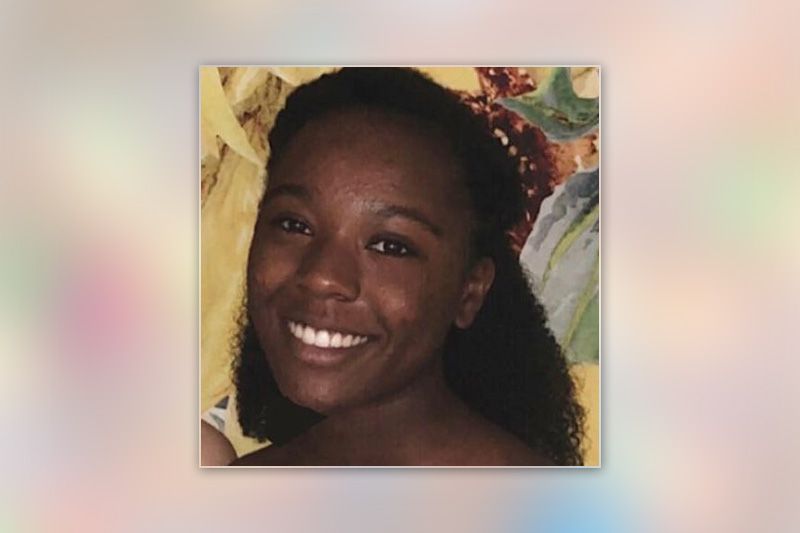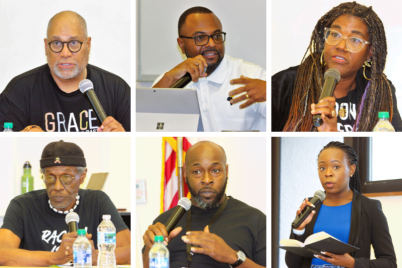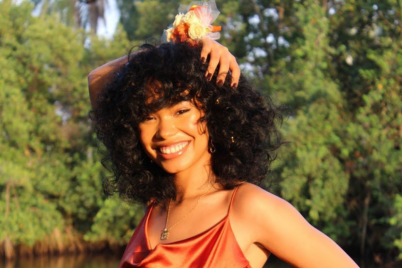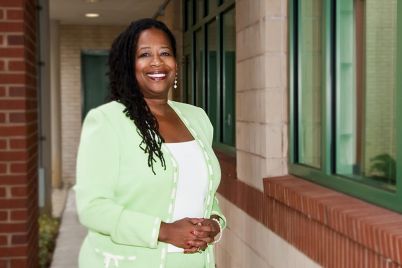Ja’Kaylah Danford
By Yamira Patterson, St. Petersburg High School student
Ja’Kaylah Danford is a senior at St. Petersburg High School in the International Baccalaureate Program.
Yamira: What are some of your experiences with racism and anti-Blackness in your school or past schools? How have your experiences affected your mental health?
Ja’Kaylah: I have not had any direct experiences with racism or anti-Blackness within my school. However, I know that it exists both within the students and the curriculum that we are taught. My personal experience with such has primarily manifested in internalized racism, primarily from being in predominantly white schools and programs since first grade.
This disproportion ruined my mental health and self-worth, especially in middle school. I felt an inexplicable need to prove myself as a Black student. My perception of myself was intensely warped, and I feared others would see me as inferior simply because I differed from the majority.
While I could not place my feelings then, I can now say that I was not ashamed of being Black, but I was ashamed of standing out. Thus, I became incredibly conscious about how I presented myself to the world.
Yamira: What are some examples of microaggression that you have experienced from teachers or peers? How have these microaggressions influenced your relationships with them?
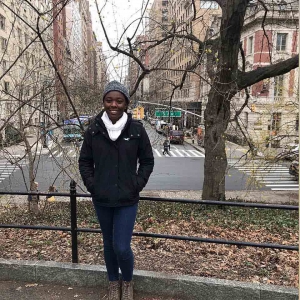
Ja’Kaylah Danford
Ja’Kaylah: I have heard the phrases “you don’t act Black” or “you’re not really Black” more times than I could ever count. It has always come from my peers, and every time it was meant as a compliment of sorts. Even though the notion of being different from “other” Black people is built upon racist stereotypes, I regard these instances as microaggressions simply because I know they were meant to be harmless.
However, they have affected me deeply to this day. I have always felt alienated from my white peers, knowing that I would always be seen as “other”. Being told that I wasn’t “really Black” insisted that being Black was a bad thing, and the fact that I didn’t act that way put me above others.
Yamira: Discuss a time where you felt like your teacher(s) made an effort to be intentional with their language about racism in their class? If so, how did that make you feel?
Ja’Kaylah: Earlier this year, before we began studying August Wilson’s “Fences,” we had a brief discussion about the use of the N-word within the play. While I certainly do trust my English teacher, I felt apprehensive listening to my white peers discussing a topic so sensitive, not having nearly as personal of a relationship to it as I did. In the end, I appreciated the effort, as it seemed more effective than just ignoring the word altogether and the connotation it has within the story.
Yamira: What are your thoughts on “controversial” language like the term “minorities” and “illegals?” How has this language affected your experience in your school community?
Ja’Kaylah: Hearing this kind of language makes me very upset, especially within my predominately white school community, because there are so many alternative phrases that are not insensitive. Also, people who use this kind of language often try to justify it by saying that it is “accurate” or by accusing everyone else of being too “politically correct,” which goes to show the lengths they will go to avoid being respectful to others.
It is not hard to be respectful to others. For some odd reason, I still hear people use the phrase “Blacks” in reference to Black people in history, and it makes me incredibly uncomfortable and conscious of the fact that I differ from the majority. It makes me ask myself if they are comfortable enough to reduce a group of people in history to such a term then, what is stopping them from doing the same to me?
Yamira: When was the first time you had a teacher who looked like you? What did they teach? How have they affected you?
Ja’Kaylah: The first time I had a Black teacher was my eighth-grade algebra teacher. Looking back on this, it baffles me how I went through almost a decade of schooling before having a teacher that looked like me. In all honesty, I did not enjoy the class for personal reasons. However, I did like my teacher as a person, and she instilled a lot of confidence into me that year — some of which I still carry to this day.
Yamira: How has your relationship with BIPOC (Black, Indigenous, People of Color) teachers affected your experiences in the classroom?
Ja’Kaylah: To be fair, I have only had three BIPOC teachers in eighth, ninth, and tenth grades. The most influential of those would be my eighth-grade algebra teacher. Being one of the very few Black students in the gifted program, it felt good to finally have a teacher that looked like me, allowing me to feel less out of place.
Yamira: In your experience, what have teachers and administrators done that have proven to be effective or harmful in approaching BIPOC students about combating racism in your school community?
Ja’Kaylah: When approaching BIPOC students about combating racism within the community, I believe there is a fine line between valuing individual perspectives and tokenism. Of course, the latter is harmful. Any time I have been singled out to provide my insight, it has proved to be counterproductive.
Rather than feeling like my voice is being heard, I feel like a token of sorts, being used to prove that a specific person is “inclusive” enough. Thus, an effective way to do so would be approaching BIPOC students with respect and respecting their boundaries within such conversations.
Yamira: In your experience, do you feel like your perspective or experiences are welcomed and respected by your teachers? How has this affected your experiences in the classroom?
Ja’Kaylah: I do feel as if my perspective and experiences are welcomed by many of my teachers. Of course, this makes me feel more comfortable within the classroom knowing that I have somewhat of a voice. Within discussions of BIPOC issues I am not afraid to provide my opinions or challenges my peers, and I believe this allows for a more productive environment.
Yamira: How would you envision anti-racist education being implemented in your school community? Are there programs that you are interested in?
Ja’Kaylah: My idea of anti-racist education within school communities would start with making sure students of color have equal access to education. Personally, I have never felt that a certain lesson or curriculum was racist, but that the system itself puts BIPOC students at a large disadvantage.
For example, it is obvious that IB is a predominately white program. However, this creates a vicious cycle in which these students get an academic edge within college and beyond, and this keeps BIPOC participation in the program low. I believe that the first step to anti-racist education would be ensuring equal opportunity to such programs that prepare students for the future.
Yamira: What role should BIPOC students play in implementing anti-racist education in the classroom?
Ja’Kaylah: I believe the responsibility to implement anti-racist education within the classroom should go largely to BIPOC educators and community organizers. While students should absolutely have a voice in these decisions and processes, I do not think the responsibility should fall on the students themselves.
I can open up about my experiences with racism and anti-Blackness within the classroom and give ideas on how it may be combatted, but ultimately it is up to the adults in charge. Not only do they have the power needed to push an anti-racist curriculum, but hey have the resources to do so.
Yamira: What were your thoughts and feelings during the start of the Black Lives Matter protests following George Floyd’s murder?
Ja’Kaylah: Following George Floyd’s murder, I remember feeling incredibly burnt out. Not because of the protests themselves or the people genuinely using their platform for good. I became exhausted by the surge of performative social media “activism” that ensued.
I was tired of seeing the video of Floyd being brutally murdered on my Instagram explore page. I was tired of seeing people use BLM for profit (selling face masks, t-shirts, etc.), and I was tired of seeing my white peers use protests as photoshoots for internet “woke” points.
Most of all, I remember feeling incredibly guilty for being so burnt out. I felt like as a Black person I had some unsaid responsibility to speak up; to post open wounds to my Instagram story as a means to educate my peers on why this obviously was a tragedy.
Yamira: After the events last summer, do you believe that your classmates have tried to educate and revise themselves in light of the protests? How so?
Ja’Kaylah: Yes and no. Of course, I want to believe that all of my classmates have been learning about BIPOC issues and are better, more inclusive people. However, I know that absolutely is not true. As I mentioned before, I was incredibly overwhelmed by the surge of performative social media “activism” that I observed from my peers this summer.
My first major encounter with this was #BlackOutTuesday, which to this day makes me insufferably angry. Seeing countless black screens on my Instagram feed made me angry. And while I know that “it’s the thought that counts,” it made me angry because I knew the thought behind it was purely performative.
In fact, many of these people followed their proclamation of allyship with photos from their “Independence” Day celebrations only a month later. So, my opinion on the matter is mixed. I want to believe that social media activism is beneficial in how it relates information to our technological generation and that it has genuinely changed the way many of my classmates view BIPOC issues. However, I think that those cute infographics tend to act more as peer-pressure, if anything else, with people reposting them without thought because they saw it on their friend’s story.
Yamira: What advice, if any, do you have for teachers who want to be better allies for BIPOC students?
Ja’Kaylah: My advice for any teacher looking to be a better ally for BIPOC students is to simply be conscious of how those students feel. Especially for students in predominantly white environments, it is already difficult enough dealing with racism and microaggressions from our community and small inconsiderate actions from educators can have a largely negative impact.
For example, I mentioned earlier the discussion I had in my English class about the use of the N-word in literature. In the assignment that followed, my teacher pulled a quote from an article by a Black author, displaying the N-word uncensored on the assignment page.
With this being a class taught by a white teacher, with mostly white students, this small, unavoidable instance made me feel incredibly uncomfortable completing the assignment. Thus, my advice is to be incredibly conscious and deliberate in the language used within the classroom and consider how it will affect BIPOC students.
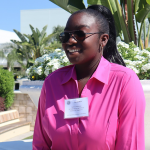
Yamira Patterson
Yamira Patterson is a junior at St. Petersburg High School in the International Baccalaureate Program. She is a student activist coordinator with Amnesty International USA and involved in various youth-led advocacy organizations. She is also the SPHS Black Students Association’s co-president and the SPHS Amnesty International Club president.


